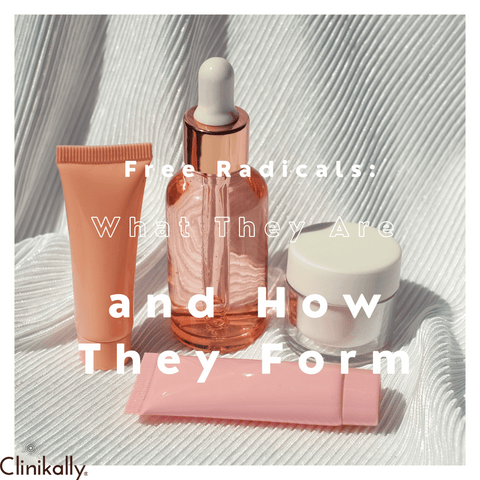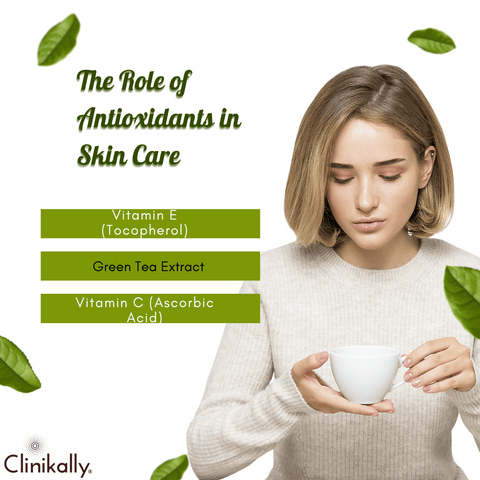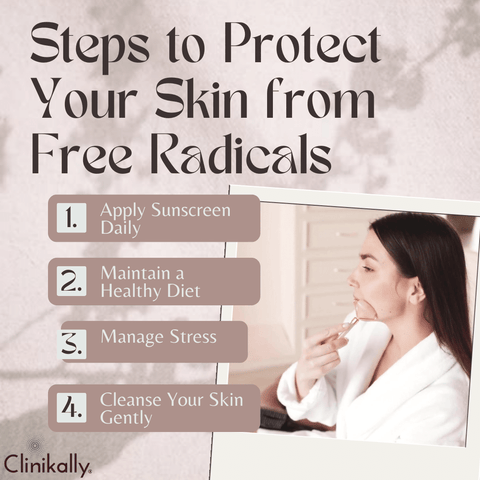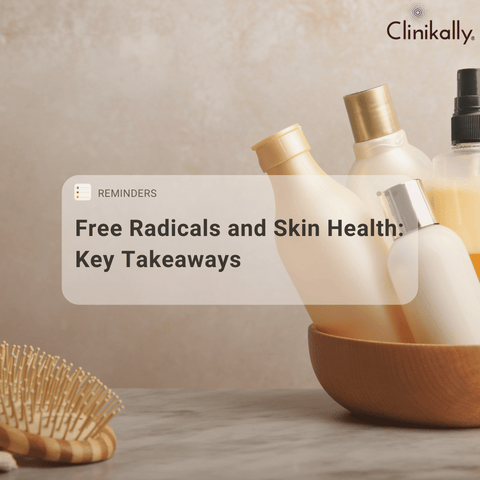The skin is the human body's biggest organ and serves as the first line of defence against external environmental variables. It is, nevertheless, continually exposed to a variety of challenges, both visible and unseen, that might jeopardise its health and attractiveness. Among these hidden risks, free radicals are important in destroying skin cells and hastening the aging process. In this blog, we will look at free radicals, their sources, and how they affect skin health. Furthermore, we will investigate preventive methods and skincare routines that can mitigate their negative effects.
Free Radicals: What They Are and How They Form

Free radicals are molecules or atoms with one or more unpaired electrons in their outermost electron shell. Because of the unpaired electron, they are unstable and highly reactive. Free radicals attempt to steal electrons from other adjacent molecules in order to establish stability, which can result in a chain reaction of electron theft and cellular damage. This is referred to as oxidative stress. A good diet, frequent exercise, and shielding the skin from UV radiation are all ways to reduce the impact of free radicals and maintain overall well-being. Furthermore, integrating antioxidant-rich foods and supplements into the diet can aid in the neutralisation of free radicals and the support of cellular health.
The Science Behind Free Radicals
Understanding free radicals' chemical structure, production, and involvement in oxidative stress is the science underlying them. Free radicals are molecules or atoms with an unpaired electron in their outermost electron shell, which makes them extremely reactive. To establish stability, free radicals seek to couple their unpaired electron with another electron, resulting in an electron transfer chain reaction in biological systems. This reaction is known as oxidation, and the molecules that facilitate it are known as oxidants or reactive oxygen species (ROS). Chronic oxidative stress and excessive free radical generation can cause cellular damage and contribute to the development of diseases such as cardiovascular disease, neurological diseases, and cancer.
Common Sources of Free Radicals
Endogenous (internal) and exogenous (external) sources can both produce free radicals. There are several sources that can contribute to the formation of reactive oxygen species (ROS) and other free radicals. To name a few sources of free radicals, they include metabolism, ultraviolet (UV) radiation, pollution, cigarette smoke, radiation, pesticides and chemicals, inflammation, an unhealthy diet, exercise, and medications and treatments. It is critical to emphasize that the body has natural defence systems, such as antioxidants, to combat free radicals. Antioxidants help reduce the harmful effects of free radicals by providing electrons and thus stabilizing them. A balanced antioxidant-rich diet, combined with a healthy lifestyle and adequate protection from environmental stressors, can help maintain the delicate balance between free radicals and antioxidants in the body and support overall health.
Unveiling the Impact of Free Radicals on Your Skin

Free radicals have an important role in both intrinsic (natural) and extrinsic (environmental) aging. The body's natural defence mechanisms, including antioxidant levels, may drop as we age, resulting in an imbalance of free radicals and antioxidants. This imbalance causes oxidative stress, which damages skin cells and their constituents like collagen, elastin, and DNA. The cumulative effect of oxidative stress shows up as apparent aging markers, such as:
-
Fine Lines and Wrinkles: Collagen and elastin fibres are essential for skin elasticity. Free radicals degrade these fibres, resulting in wrinkles and fine lines.
-
Uneven Skin Tone: Oxidative stress can affect melanin-producing cells (melanocytes), resulting in an uneven distribution of pigment and the formation of age spots and hyperpigmentation.
-
Dull and Dehydrated Skin: Free radicals can disrupt the skin's natural barrier function, causing moisture loss, dryness, and a dull complexion.
-
Loss of Firmness: When collagen and elastin fibres are damaged, the skin loses its firmness and suppleness.
How Free Radicals Damage Skin Cells
Free radicals are involved in both intrinsic (natural) and extrinsic (environmental) aging. The body's natural defensive mechanisms, including antioxidant levels, may decline as we age, resulting in a free radical-antioxidant imbalance. This imbalance results in oxidative stress, which harms skin cells and their contents such as collagen, elastin, and DNA. The cumulative effect of oxidative stress manifests in visible aging markers such as:
-
Lipid Peroxidation: Free radicals can attack and damage the lipids (fats) found in cell membranes. Lipid peroxidation occurs when free radicals steal electrons from lipids, causing a chain reaction that produces even more free radicals. This process degrades the cell membrane's integrity and permeability. As a result, potentially harmful substances can enter the cell while essential nutrients and moisture can escape.
-
Protein Damage: Proteins are necessary for the structure and function of the skin. Free radicals can alter or degrade proteins such as collagen and elastin. Collagen gives skin strength and elasticity, while elastin helps skin bounce back after stretching. Free radical damage to these proteins causes wrinkles, sagging skin, and loss of firmness.
-
DNA Mutations: DNA, the genetic material found within skin cells, is susceptible to free radical attack. When free radicals react with DNA molecules, they can cause mutations or breaks in the DNA strands. If not repaired properly, these mutations can cause errors in cell replication and potentially contribute to the development of skin cancers.
-
Inflammation: Free radicals cause inflammation by activating various signaling pathways in the skin. While inflammation is a normal reaction to injury or infection, chronic inflammation caused by an abundance of free radicals can be harmful to skin cells. Prolonged inflammation can cause tissue damage, impair the skin's barrier function, and aggravate acne and rosacea.
-
Antioxidant depletion: Free radicals within the skin can consume antioxidants. Antioxidants play an important role in neutralising free radicals by donating electrons while remaining stable. When free radicals outnumber antioxidants, the antioxidants' protective capacity is overwhelmed, allowing oxidative stress to occur.
The Connection Between Free Radicals and Aging
The process of oxidative stress is the link between free radicals and aging. Free radicals are extremely reactive compounds that contain unpaired electrons, making them unstable. They seek to couple their unpaired electron with another electron in order to establish stability, resulting in a chain reaction of cellular destruction. This reaction is known as oxidation, and the molecules that facilitate it are known as oxidants or reactive oxygen species (ROS). The body's natural defence mechanisms, including antioxidant levels, may drop as we age, resulting in an imbalance of free radicals and antioxidants. This imbalance causes oxidative stress, which occurs when there is an overabundance of free radicals in comparison to the body's ability to neutralise them.
The Role of Free Radicals in Aging:
-
Cellular Damage: Free radicals cause oxidative stress, which damages various cellular components such as lipids, proteins, and DNA. This damage can result in cellular dysfunction and impaired cell signaling, affecting the overall health and function of cells.
-
Degradation of Collagen and Elastin: Free radicals contribute to the breakdown of collagen and elastin, two essential proteins that keep skin strong, supple, and firm. As these proteins degrade, the skin loses elasticity, resulting in wrinkles and fine lines.
-
DNA Mutations: Free radicals can cause mutations in DNA, the genetic material found within cells. Accumulated DNA damage can cause mistakes in cell replication and potentially disrupt cellular function. This can lead to cellular aging and an increased risk of age-related diseases, including cancer, over time.
-
Inflammation: Excessive free radicals can cause chronic inflammation. Swelling is a common response to injury or infection, but chronic swelling brought on by oxidative stress can harm tissues and organs and hasten age.
-
Telomere Shortening: With each cell division, the protective caps at the ends of chromosomes known as telomeres become shorter. Free radicals can contribute to telomere shortening, which is associated with cellular aging and senescence (cellular aging and loss of function).
-
Mitochondrial Dysfunction: Mitochondria, the energy-producing organelles within cells, are susceptible to free radical damage. This can lead to impaired energy production and increased oxidative stress, further contributing to cellular aging.
Free Radicals and Skin Inflammation
Through a process known as oxidative stress, free radicals play a crucial role in skin inflammation. The body's natural response to damage, illness, or irritation is skin inflammation, which involves the activation of the immune system to combat harmful stimuli. While inflammation is an important defence mechanism, chronic or severe inflammation can cause tissue damage and contribute to a variety of skin problems.
The Role of Free Radicals in Skin Inflammation:
-
Immune Cell Activation: Free radicals can activate immune cells such as macrophages and neutrophils, causing them to release pro-inflammatory cytokines and chemokines. These signaling molecules attract more immune cells to the site of inflammation, causing the inflammatory response to persist.
-
Skin Cell Damage: Free radicals can cause damage to the cell membranes and organelles of skin cells. This damage causes the release of inflammatory mediators, which promote further inflammation.
-
Amplification of the Inflammatory Cascade: Free radicals can set off a chain reaction of oxidative stress and inflammation. As more cells are damaged, they release more free radicals and pro-inflammatory molecules, further exacerbating the inflammatory cascade.
-
Impairment of Barrier Function: Oxidative stress can impair the skin's natural barrier function, making it more vulnerable to irritants and allergens. This can cause inflammatory responses in the skin.
-
Chronic Inflammation: Prolonged exposure to free radicals and oxidative stress can cause chronic inflammation, which can contribute to skin disorders and exacerbate existing conditions such as acne, eczema, psoriasis, and rosacea.
Skin Conditions Associated with Free Radical-Induced Inflammation:
-
Acne: Excess sebum production and the presence of bacteria in acne-prone individuals can cause inflammation within the hair follicles. This inflammatory response can be exacerbated by free radicals, resulting in the formation of inflamed acne lesions.
-
Eczema (Atopic Dermatitis): Eczema is characterized by dry, itchy skin that is red and inflamed. The skin's barrier function can be weakened by oxidative stress, allowing irritants and allergens to penetrate and trigger or worsen eczema flare-ups.
-
Psoriasis: Psoriasis is an autoimmune skin condition characterized by red, scaly patches. Free radicals can cause inflammation and accelerate skin cell turnover, resulting in a buildup of dead skin cells on the skin's surface and the formation of psoriatic plaques.
-
Rosacea: Free radicals and oxidative stress can cause inflammation and dilation of blood vessels in the face, exacerbating rosacea symptoms like facial redness and flushing.
People can take preventative measures to safeguard their skin and advance a healthier complexion by becoming aware of the connection between free radicals and skin inflammation.
The Role of Antioxidants in Skin Care

Antioxidants are essential in skincare because they neutralise free radicals and protect the skin from oxidative stress. Because free radicals are extremely reactive molecules, they can cause damage to numerous components of skin cells, resulting in accelerated aging, skin inflammation, and an increased risk of skin problems. Antioxidants aid in the maintenance of a delicate equilibrium between free radicals and the body's defence mechanisms, preventing and healing oxidative stress damage. The following are the primary functions of antioxidants in skincare:
-
Neutralising Free Radicals: Antioxidants have an extra electron that they can donate to free radicals without becoming unstable themselves. By doing so, antioxidants effectively neutralise free radicals, halting the chain reaction of cellular damage and preventing oxidative stress.
-
Collagen and elastin protection: Collagen and elastin are essential proteins that keep skin structure, elasticity, and firmness. These proteins can be broken down by free radicals, resulting in wrinkles and sagging skin. Antioxidants protect collagen and elastin by reducing free radical damage, resulting in a more youthful appearance.
-
Reducing Skin Inflammation: Free radicals contribute to skin inflammation by activating immune cells and releasing pro-inflammatory molecules. Antioxidants can help to calm and soothe the skin by modulating the inflammatory response.
-
Promoting Skin Repair: Antioxidants support the skin's natural repair process by aiding in the synthesis of new collagen and promoting healthy cell turnover. This may result in a more even skin tone and better skin texture.
-
Protecting Against UV Damage: While antioxidants cannot replace the need for sunscreen, they can supplement sun protection by reducing the impact of UV radiation on the skin. UV rays generate free radicals, and antioxidants help to mitigate the damage caused by these harmful molecules.
Antioxidants That Are Commonly Used in Skincare:
-
Vitamin C (Ascorbic Acid): A powerful antioxidant that brightens and evens out skin tone while also increasing collagen production.
-
Vitamin E (Tocopherol): Protects the skin from UV damage, moisturises, and improves the skin's natural barrier function.
-
Green Tea Extract (Epigallocatechin Gallate - EGCG): Green tea extract is high in polyphenols and has powerful antioxidant and anti-inflammatory properties.
-
Resveratrol: Resveratrol, which is found in grapes and berries, protects the skin from oxidative stress and promotes skin rejuvenation.
-
Niacinamide (Vitamin B3): Aids in the improvement of skin texture, the reduction of redness, and the strengthening of the skin barrier.
Adopting a healthy lifestyle that includes a balanced antioxidant-rich diet, staying hydrated, getting enough sleep, and avoiding excessive sun exposure and smoking will also help your skin's health and boost the advantages of antioxidant skincare. You can protect your skin from free radical damage, create a more youthful complexion, and maintain general skin health by harnessing the power of antioxidants.
What Are Antioxidants and How Do They Work?
Antioxidants are chemicals found in a variety of foods and supplements that play an important role in the body's health. They shield the body from dangerous chemicals known as free radicals, which can cause oxidative stress and cell damage, potentially leading to a variety of health problems and hastening the aging process. Free radicals are extremely reactive compounds with unpaired electrons. They are produced naturally within the body by a variety of metabolic processes, but they can also be introduced from outside sources such as pollution, cigarette smoke, and radiation. When free radicals accumulate in the body, they can cause damage to biological components like proteins, lipids, and DNA.
There are several types of antioxidants, which can be divided into two categories:
-
Endogenous antioxidants: These are substances the body naturally produces, and they include catalase, glutathione peroxidase, and superoxide dismutase. They function within cells to combat free radicals and preserve the delicate oxidative stress balance.
-
Exogenous antioxidants: These are sourced externally, primarily from the diet. Vitamins (such as vitamin C, E, and beta-carotene), minerals (such as selenium and zinc), and phytochemicals (such as flavonoids and polyphenols) found in fruits, vegetables, nuts, and seeds are examples of common dietary antioxidants.
While antioxidants provide considerable health advantages, the notion that more antioxidants are always better is not totally correct. For different physiological activities, the body requires a careful balance of oxidative stress. Excessive antioxidant supplementation beyond suggested levels may not give any advantages and may even be hazardous. To discover the right levels of antioxidants for individual needs, check with a healthcare expert or a qualified dietitian, as with any dietary or health-related concern.
Popular Antioxidant-Rich Skincare Ingredients
Because of their capacity to counteract free radicals and promote healthier-looking skin, antioxidant-rich skincare components are frequently used in beauty and skincare products. Among the most popular antioxidant-rich skincare components are:
-
Vitamin C (Ascorbic Acid): Vitamin C is a strong antioxidant that fights free radicals, brightens the skin, and encourages the production of collagen. It can help to reduce the visibility of fine lines, wrinkles, and uneven skin tone.
-
Vitamin E (Tocopherol): Vitamin E is another potent antioxidant that works well in conjunction with vitamin C. It protects the skin from environmental damage, reduces inflammation, and helps to maintain the skin's natural barrier function.
-
Green Tea Extract: Green tea is high in polyphenols, such as catechins, which have anti-inflammatory and antioxidant properties. Green tea extract can help to reduce redness and irritation while also protecting the skin from environmental stressors.
-
Resveratrol: This antioxidant is commonly found in grapes and berries and has been linked to anti-aging benefits. Resveratrol aids in the neutralisation of free radicals and the production of collagen.
-
Niacinamide (Vitamin B3): Niacinamide is an antioxidant that improves skin texture, reduces the appearance of pores, and reduces inflammation. It also aids in the preservation of the skin's moisture barrier.
-
Ferulic Acid: Ferulic acid is frequently combined with vitamins C and E to improve their stability and efficacy. It adds antioxidant protection and aids in the fight against UV-induced skin damage.
-
Coenzyme Q10 (Ubiquinone): Coenzyme Q10 is found naturally in the body and aids in the generation of energy in cells. It protects the skin from oxidative stress and promotes skin repair as an antioxidant.
-
Retinol (Vitamin A): While retinol is best known for its anti-aging properties and ability to increase collagen production, it also has antioxidant properties that contribute to its overall skin benefits.
-
Lycopene: Lycopene is a red pigment found in tomatoes and other fruits. It is well-known for its potent antioxidant properties, which can aid in UV protection.
-
Alpha Lipoic Acid: Because alpha lipoic acid is both water and fat-soluble, it is a versatile antioxidant that can work throughout the skin's layers. It can help to reduce the appearance of fine lines, wrinkles, and uneven skin texture.
These antioxidant-rich compounds are frequently found in serums, moisturisers, face masks, and other types of skincare products. They work together to protect the skin from environmental aggressors, reduce aging indications, and produce a more radiant and youthful complexion. Consider your skin type and individual concerns when selecting antioxidant-rich skincare products, and always follow the prescribed usage recommendations for best results.
Steps to Protect Your Skin from Free Radicals

Protecting your skin from free radicals is critical for maintaining its health and preventing premature aging. Here are some precautions you can take to protect your skin from free radical damage:
-
Use Antioxidant-Rich Skincare Products: Incorporate antioxidant-rich skincare products into your daily routine, such as vitamin C, vitamin E, green tea extract, or resveratrol. These products can aid in the neutralisation of free radicals and the protection of your skin from oxidative stress.
-
Apply Sunscreen Daily: Sunscreen is essential for protecting your skin from the harmful effects of UV radiation, which can cause free radicals. Choose a broad-spectrum sunscreen with at least SPF 30 and apply liberally to all exposed skin, even on cloudy days.
-
Limit Sun Exposure: In addition to wearing sunscreen, try to avoid direct sun exposure between 10 a.m. and 4 p.m. Seek shade, wear protective clothing, and wear hats and sunglasses to reduce your exposure to the sun.
-
Maintain a Healthy Diet: Eat a well-balanced diet rich in fruits, vegetables, whole grains, nuts, and seeds. These foods are high in natural antioxidants, which can help with overall skin health.
-
Stay Hydrated: Drinking plenty of water helps keep the skin's moisture balance in check, which is essential for its overall health and resilience.
-
Avoid Smoking and Secondhand Smoke: Smoking causes the body to produce harmful free radicals, hastening the aging process. If you smoke, think about quitting and avoiding secondhand smoke as much as possible.
-
Manage Stress: Chronic stress can cause the body to produce more free radicals. Practise stress-relieving activities such as meditation, yoga, deep breathing exercises, or spending time in nature.
-
Cleanse Your Skin Gently: Wash your face twice a day with a mild cleanser to remove dirt, makeup, and pollutants that can contribute to oxidative stress on the skin.
-
Limit Alcohol Consumption: Excessive alcohol consumption can result in the formation of free radicals. Drink alcohol in moderation or avoid it entirely.
-
Avoid Environmental Pollutants: As much as possible, try to limit your exposure to air pollution and environmental toxins. When the air quality is poor, stay indoors or use air purifiers.
-
Moisturise on a regular basis: Moisturising your skin helps to maintain its protective barrier and reduces the risk of oxidative damage.
-
Use Retinoids or Retinol: Topical retinoids or retinol products can not only help with signs of aging but also provide some protection against free radical damage.
Enhancing Your Skincare Routine
Improving your skincare routine can lead to better skin health and address specific concerns. Here are a few steps you can take to improve your skincare routine:
-
Identify Your Skin Type: Knowing your skin type (e.g., dry, oily, combination, sensitive) is essential for choosing the right products. Different skin types have different needs, so tailor your routine accordingly.
-
Cleaning: Use a gentle cleanser that is appropriate for your skin type to remove dirt, makeup, and impurities without removing essential oils. Face cleansing should be done twice a day, in the morning and evening.
-
Exfoliation: Exfoliation on a regular basis can help remove dead skin cells, unclog pores, and promote skin cell turnover. However, excessive exfoliation can cause irritation. 1-2 times per week is usually enough for most skin types.
-
Antioxidant Serum: Consider incorporating an antioxidant-rich serum into your routine, such as one containing vitamin C or green tea extract. These serums can help protect your skin from free radicals while also brightening it.
-
Moisturise: Hydrate your skin with a moisturiser that is appropriate for your skin type. Moisturising aids in the retention of moisture and the maintenance of your skin's barrier function.
-
Sunscreen: Sunscreen is an essential component of any skincare regimen. Even on cloudy days, use a broad-spectrum sunscreen with at least SPF 30 every morning.
-
Eye Cream: Think about using a specialised eye cream with peptides, hyaluronic acid, or retinol if you have concerns about the skin around your eyes (such as puffiness, dark circles, or fine lines).
-
Targeted Treatments: Seek out targeted treatments like acne spot treatments, serums with niacinamide or alpha hydroxy acids, or retinoids for anti-aging benefits if you have specific skin issues (such as acne, hyperpigmentation, or fine lines).
-
Face masks: Include face masks in your routine, paying attention to your skin's requirements. As an illustration, clay masks can help oily skin while hydrating masks can hydrate dry skin.
-
Hydration from Within: To keep your skin hydrated from the inside out, drink lots of water throughout the day.
-
Healthy Eating: A balanced diet that includes fruits, vegetables, and essential nutrients can have a positive effect on the health of your skin.
-
Avoid Touching Your Face: Try to avoid touching your face as much as possible throughout the day to avoid transferring dirt and bacteria to your skin.
-
Get Enough Sleep: For your skin to heal and regenerate, aim for 7-9 hours of quality sleep each night.
-
Manage Stress: Find healthy ways to manage stress, such as exercise, meditation, or spending time doing activities you enjoy. Chronic stress can have a negative impact on the health of your skin.
-
Consult a Professional: If you have persistent skin issues or specific concerns, consider consulting a dermatologist or skincare professional for personalized recommendations.
Lifestyle Changes to Minimize Free Radical Damage
To prevent free radical damage in your body, make specific lifestyle modifications that can assist reduce free radical generation and boost your body's ability to neutralise them. A balanced diet, avoiding smoking and secondhand smoke, limiting alcohol intake, staying hydrated, regularly exercising, managing stress, avoiding environmental toxins, sleeping well, protecting your skin from UV rays, using antioxidant-rich skincare, eating organic foods, avoiding overcooking foods, consuming foods high in omega-3 fatty acids, and limiting processed and sugary foods are some lifestyle changes to consider. You can minimise free radical damage, enhance general health, and support your skin's natural capacity to stay healthy and beautiful by implementing these lifestyle modifications into your daily routine. As with any lifestyle change, consistency and patience are required, as significant improvements in your health and well-being may take time.
Free Radicals and Skin Health: Key Takeaways

Key Points to Remember About Free Radicals and Skin Health:
-
Free radicals are highly reactive molecules with unpaired electrons that can cause cellular damage and contribute to aging and various skin issues.
-
Oxidative stress occurs when there is an imbalance between free radicals and antioxidants in the body, leading to cellular damage.
-
Sources of free radicals include UV radiation, pollution, smoking, unhealthy diets, and other environmental factors.
-
Free radical damage can lead to collagen breakdown, premature aging, fine lines, wrinkles, hyperpigmentation, and other skin concerns.
-
Antioxidants are compounds that neutralize free radicals by donating electrons, protecting cells from oxidative stress.
-
Antioxidant-rich skincare ingredients, such as vitamin C, vitamin E, green tea extract, and resveratrol, can help protect the skin from free radical damage.
-
Sunscreen is a vital part of any skincare routine to shield the skin from UV-induced free radical production.
-
A balanced diet with plenty of fruits, vegetables, and whole grains provides essential antioxidants to combat free radicals and support skin health.
-
Healthy lifestyle habits, including regular exercise, adequate sleep, stress management, and avoiding smoking and excessive alcohol intake, can minimize free radical damage.
-
Consistency is crucial in maintaining a skincare routine and making lifestyle changes to promote skin health and minimize free radical damage over time.
You can promote your skin's health and retain a more youthful, beautiful complexion by being proactive in protecting your skin from free radicals, implementing antioxidant-rich products, and making good lifestyle choices. If you have specific skin concerns or require personalised guidance, consult with a dermatologist or skincare professional.
































